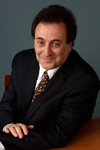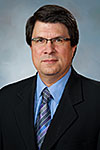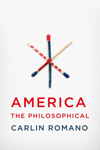Author says U.S. has amazing philosophical culture
Carlin Romano points to bookstores as evidence of the U.S.’s wealth of philosophical diversity and openness of discussion.
“Walk into one, and you will find books on every topic, attitude and belief imaginable,” said Romano, an author and professor of philosophy and humanities at Ursinus College of Collegeville, Pa. “We have ready access to books about different cultures, religions, values and political stances. There are so many viewpoints openly available for discussion with no real limits.”
Romano is the next speaker in the spring University of Houston-Victoria/American Book Review Reading Series. His reading will begin at noon March 1 in the UHV University West Alcorn Auditorium, 3007 N. Ben Wilson St. It is free and open to the public.
“Carlin Romano has a refreshing attitude toward philosophy in American culture,” said Jeffrey Di Leo, ABR editor and publisher, and dean of the UHV School of Arts & Sciences. “His optimistic outlook and analysis of our society in a more-than-600-page book is a thorough and insightful look into our society. I look forward to hearing his presentation.”
Romano’s belief in the U.S. as a philosophical culture first began from his observations working as a journalist overseas. In many cultures, freedom of speech is not as openly protected and practiced as it is in the U.S., he said.
“There’s a common perspective that the U.S. culture is intellectually deficient or waning,” Romano said. “Some say there’s only this obsession with our country maintaining its status as a world power. But if you look at talk radio, TV programs and other popular media, that’s just not true. There’s an incredible variety of dialogues covering a myriad of topics happening all the time.”
When Romano wrote his book, “America the Philosophical,” he wanted it to be accessible and appeal to anyone, not just philosophy professors and heavy thinkers, he said. He looked at and referenced many different philosophical groups as well as academics such as journalists and psychologists. He also used language that was “jazzier” and featured jokes and wordplay.
When his book focused on the work of certain philosophers, he made an effort to look at them as people instead of thinkers. For example, he included details of the life of John Rawls, an American moral and political philosopher who is considered one of the greatest philosophers on the subject of justice. Rawls’ thoughts on justice stem from an attitude he developed after some painful experiences in his own life, including when a friend was killed during World War II and he survived.
“I wanted to let people know that philosophy is not just for academics in offices and classrooms,” Romano said. “Our culture is inundated with philosophical ideas. Really, in some ways, America is a philosophical culture in spite of professors and academics, not because of them. So many of the debates and discussions going on today show how philosophical America actually is.”
Other writers scheduled for the spring UHV/ABR Reading Series are:
Debra Di Blasi, March 22 – Di Blasi is the author of six books, including “Prayers of an Accidental Nature,” “The Jiri Chronicles” and “Drought & Say What You Like,” which won the Thorpe Menn Literary Excellence Award. She recently completed a flash fiction collection and a hybrid memoir that was a finalist in Four Way Books’ Larry Levis Poetry Prize and a semifinalist in Seneca Review’s Deborah Tall Lyric Essay Award. Her writing has appeared in The Iowa Review, Triquarterly, Notre Dame Review, Pleiades, The Collagist, New South, Kestrel, Wigleaf, The Los Angeles Review, Chelsea, Boulevard and Virga, among others, and in notable anthologies of innovative writing. She is a former publisher, educator and art columnist.
Matt Bell, April 12 – Bell is the author of the novels “Scrapper” and “In the House Upon the Dirt Between the Lake and the Woods,” as well as the short story collection “A Tree or a Person or a Wall,” a nonfiction book about the classic video game “Baldur’s Gate II,” and several other titles. His writing has appeared in The New York Times, Tin House, Conjunctions, Fairy Tale Review, American Short Fiction and many other publications. A native of Michigan, he teaches in the creative writing program at Arizona State University.
Michael Joyce, May 3 – Joyce’s 13 books include seven novels, most recently “Foucault, in Winter, in the Linnaeus Garden,” a collection of poetry titled “A Hagiography of Heaven and Vicinity,” two book-length poetic sequences titled “Biennial” and “Paris Views,” a mixed collection of media essays and short fiction from SUNY, and two influential collections of essays about digital media from the University of Michigan Press. Some of his hypertext fictions include “On the Birthday of the Stranger” in the inaugural edition of Evergreen Review online, as well as “Twilight, A Symphony” and “Twelve Blue.” His first print novel, “The War Outside Ireland,” won the Great Lakes New Writers Award.
ABR is a nonprofit, internationally distributed literary journal published six times a year. It began in 1977, moved to UHV in 2006 and has a circulation of about 8,000. The journal specializes in reviews of works published by small presses.
For more information about the UHV/ABR Reading Series, call the ABR office at 361-570-4101 or go to www.americanbookreview.org.
The University of Houston-Victoria, located in the heart of the Coastal Bend region since 1973 in Victoria, Texas, offers courses leading to more than 80 academic programs in the schools of Arts & Sciences; Business Administration; and Education, Health Professions & Human Development. UHV provides face-to-face classes at its Victoria campus, as well as an instructional site in Katy, Texas, and online classes that students can take from anywhere. UHV supports the American Association of State Colleges and Universities Opportunities for All initiative to increase awareness about state colleges and universities and the important role they have in providing a high-quality and accessible education to an increasingly diverse student population, as well as contributing to regional and state economic development.
Lauren Hightower-Emerson
361-570-4342







